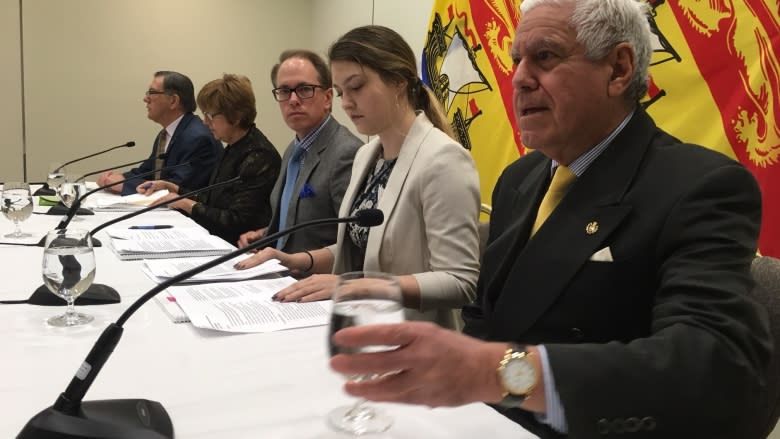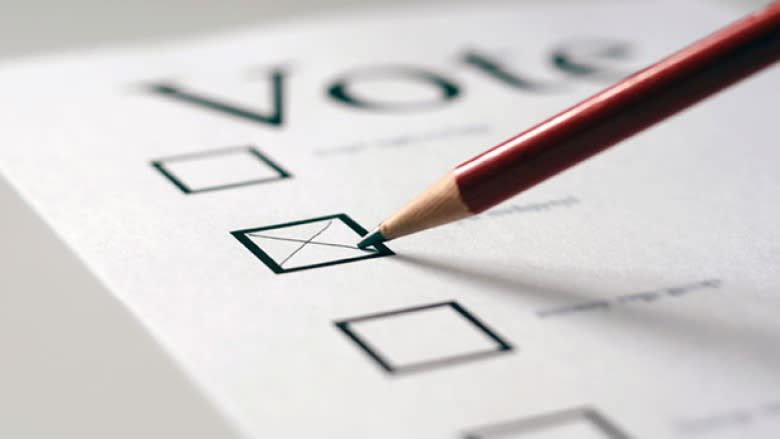N.B.'s electoral reform commission proposes preferential ballot
New Brunswickers could be casting a very different kind of ballot in the next provincial election.
An independent commission on electoral reform is recommending the province adopt a preferential ballot for choosing members of the legislature.
The commission's report, released Friday morning, says that would lead to a legislature that is more representative of what voters want.
- Opposition parties offered control of electoral reform committee
A preferential ballot "is a modest, pragmatic choice for reform that does not create its own series of problems, as a wholesale change to another electoral system would," the report says.
"It also keeps things simple and easy, so that everyone can understand how to vote and that their vote really counts."
More choices to voters
Under a preferential ballot, voters could choose to rank their preferred candidates.
In a first round of counting, only first choices would be tallied. If no candidate got more than 50 per cent, the last candidate would be dropped, and the second choices on ballots cast for him or her would be added to the totals of the remaining candidates.
That would continue until a candidate reached 50 per cent.
"Preferential Ballots in essence give more choices to the voters but do not force them to make a multitude of choices," the report says.
It also encourages candidates in the campaign "to use moderation with other candidates" in the hopes of being the second choice of their supporters, the report adds.
The commission concluded it would also be better than New Brunswick's existing first–past–the–post system, which it says "can result in a legislature that fails to reflect accurately the diversity of opinion in the province."
First–past–the–post often sees parties with less than a majority of the popular vote still win a majority of the seats.
The report says proportional representation–which awards a percentage of seats to the parties based on the percentage of the vote they get–would be "a significant departure" for New Brunswick.
But it says proportional representation should be given "some consideration" when riding boundaries are redrawn in the next decade.
The commission is recommending the preferential ballot be implemented in time for the next election, scheduled for September, 2018.
The report doesn't make any recommendation about whether New Brunswickers should vote on the change in a referendum or plebiscite.
Lower the voting age
Another major recommendation in the report is lowering the voting age and the age limit for being a candidate from 18 years to 16 years.
It says people who get involved in politics at a young age are more likely to stay involved, and it rejects the idea that 16–year–olds are too young to vote.
"The commission was encouraged by the level of maturity and intelligence displayed by the young New Brunswickers with whom it met," the report says.
But because it wants young voters to stay in school, the report says anyone 16 or older but younger than 18 wanting to run for office would have to have a valid high school diploma.
The report rejects another popular innovation that it was urged to adopt: electronic voting. It says it's still not clear the anonymity of voters can be protected.
Other recommendations include:
- Lowering the maximum donation of money to a political party by a person, union or business from the current $6,000.
- Phasing out donations from unions and businesses after the 2018 election.
- Creating a temporary financial incentive for political parties that nominate more women candidates.
- Allowing non–citizens who are permanent residents to vote in provincial and municipal elections.
- Teaching more about government, politics and voting in the school system.
- Bringing back a law that requires parties to provide a costing of their election promises.
- Moving the fixed date for provincial elections from the fourth Monday in September to the third Monday in October. That would avoid university and college students new to the province being excluded by a rule that says a voter must live here for 40 days before they can vote.
The commission produced its report relatively quickly: it began its consultations last November, and submitted its report Wednesday.
At first, the Liberal government wanted a committee of MLAs to study electoral reform.
But last summer, the Progressive Conservative opposition refused to appoint members to a legislative committee because the Liberals would not promise to hold a referendum on any of the changes.
Instead, the Liberals appointed a five–member commission made up of non–MLAs.
The commission is recommending the preferential ballot be implemented in time for the next election, scheduled for September, 2018.



